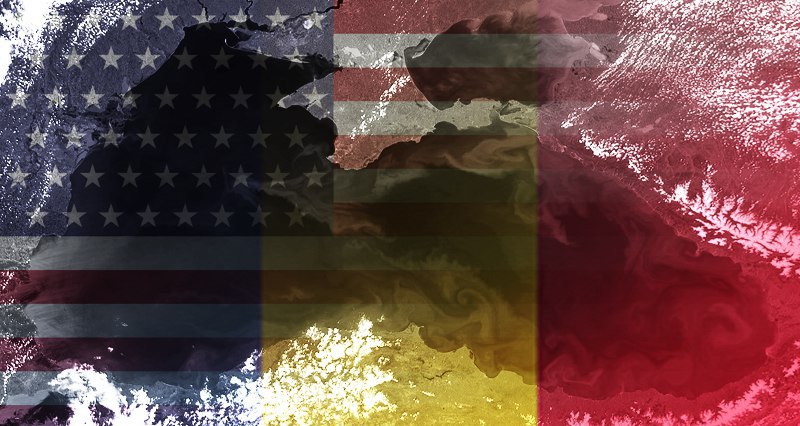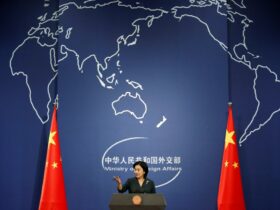Representatives and Senators in the United States’ Congress want to turn the Black Sea into a prolonged conflict zone. On March 16, a bill called the “Black Sea Security Act of 2023” was introduced to the US Senate.
Introduced by the Republican Mitt Romney and the Democrat Jeanne Shaheen, the bill received bipartisan support by cosponsors from both parties.
U.S. Romney claims that the legislation comes on “the heels of a Russian jet fighter forcing down a U.S. drone over the Black Sea”.
But both politicians had already introduced a similar bill on July 12, 2022, that is currently being dealt with in the Committee of Foreign Relations.
Senator Jeanne Shaheen is chair of the Senate Foreign Relations Subcommittee on Europe and Regional Security Cooperation. In that function, she has visited Georgia in the month of February and claimed the country’s “important elections coming up” (present) “the opportunity to advance a pro-democratic agenda”.
Shaheen has also been a frequent visitor to Ukraine and other countries of Eastern Europe.
The bill presented by the senators’ claims to “establish a U.S. strategy to the Black Sea region”.
Most ridiculous aspect: Re-defining geography
At its end, in the section “Definitions”, the bill presents its inevitably ridiculous approach to geography: “The term ‘Black Sea states’ means Turkey, Romania, Bulgaria, Moldova, Ukraine and Georgia”, it says. This is a politically motivated redefinition of maps and landscapes of course that ignores, or rather considers implicitly as a problem, the fact that the Russian Federation has – with our without Crimea – a shore to the Black Sea as well.
Russia as the adversary – turning the Black Sea into “arena”
It comes as no further surprise that the Russian Federation is considered the adversary to the “Black Sea Security”. What the bill adds to that already given US policy is to “recognize” the Black Sea region as “an arena of Russian aggression” (Sec. 2 (a) (1)).
In other words, in the “effort to prevent the spread of further armed conflict in Europe”, the United States spreads the armed conflict over the entire Black Sea region, should the proposal become law.
Besides of already well-known policies in regard to Ukraine and Crimea, the bill formulates new goals: Russia’s access to the Mediterranean through the Black Sea is considered a “threat to the national security of the United States” (Sec. 2 (a) (3)). The U.S. “condemns” Russia’s efforts to “impose a sphere of influence across the region” (4).
The Black Sea Security Act of 2023 also repeatedly claims to “counter” China’s “coercive economic pursuits” in the Black Sea states (19).
The proposed policy and actions have two legs:
1. Increased unilateral US / NATO presence
2. Increased intervention into and use of littoral states
Regular NATO presence in the Black Sea
The bill proposes as US policy “to advocate within NATO and among NATO allies to develop a regular, rotational maritime presence in the Black Sea” (Sec. 3 (3)).
It is noteworthy that, in the bill proposed in July 2022, the senators Shaheen and Romney had criticized Türkiye for its insistence on the validity of the Montreux Convention that limits non-littoral countries’ military presence in the Black Sea.
In addition, the bill proposes that the National Security Council should prepare an assessment on “the value of establishing a joint, multinational three-star headquarters on the Black Sea” (Sec. 4, (b), (1), (E)).
Furthermore, the bill proposes to “prioritize” US intelligence and surveillance activity in the Black Sea (D) and to establish a “plan for combating Russian propaganda and disinformation” (H).
Massive interventions into the littoral states
According to the act, “littoral states of the Black Sea are critical in countering aggression” by Russia (Sec. 2 (a) (1).
The long list of interaction between the US and the Black Sea states can be summarized, following the bill as, “deepen economic ties, strengthen energy security, support efforts to bolster their democratic resilience and enhance security assistance with our regional partners” (Sec 4) a)).
The goals are in other words an increased US economic presence and investment, explicitly to counter China, a growing military cooperation, increasing political intervention with the claim to limit Russian influence, that may even lead to undermining local governments under the famous claim of corruption.
Says the bill in Sec 3 (6): it is US policy to “ensure that the United States continues to support Black Sea states’ efforts to strengthen their democratic institutions to prevent corruption and accelerate their advancement into the Euroatlantic community”. It is not difficult to guess that, for the US lawmakers, corruption is the antidote of integration into Euroatlantic community, and vice versa.
The bill aims to take all the littoral states into service. Disrupting their ties with the Russian Federation especially in the field of energy cooperation and trade is an explicit goal.
Türkiye’s position
Approximately 35% of the Black Sea’s shore belongs to Türkiye, which is in addition the oldest NATO member among the littoral states.
The US bill has an interesting perspective on Türkiye.
The text criticizes Türkiye’s behavior towards “some regional allies and democratic states” as “counterproductive and calls Ankara “to avoid any actions to further escalate regional tensions” (Sec 2 (a) (9)).
It concedes that Türkiye has “played an important role” in the grain deal (17).
It states that Türkiye’s “continued delay in ratifying Sweden and Finland’s accession to NATO undermines the strength of the alliance and inhibits the united international response to Russia’s unprovoked war in Ukraine” (20).
And very interestingly, there is a list of the littoral countries that shall receive increased security assistance – and Türkiye is the only one not mentioned there (Sec 4 (b) (1) (C)).
Diplomacy traffic in and from Türkiye
Meanwhile, diplomatic traffic to and from Ankara is very active. British Chief of Staff Tony Radakin visited the Turkish Minister of Defense, Hulusi Akar.
Speaking to the press, Akar said that the issue of access to the Black Sea to recover the wreck of the downed US UAV was debated within the government and with its partners.
Turkish President’s spokesman Ibrahim Kalın was on a tour in the United States, meeting several US senators and representatives. Among these was also: Jeanne Shaheen and the notorious Neocon Lindsay Graham.
Türkiye is heading to elections, and the animosity against the country in the US Congress is well known.
On the other side, the Black Sea Security Act of 2023 has just entered the legislative process. The bill is currently in the Foreign Affairs Committee and has still a long way to go before becoming law.
Notwithstanding that process, its bipartisan introduction already reveals that the United States wants to turn the entire Black Sea region into a conflict zone.

















Leave a Reply